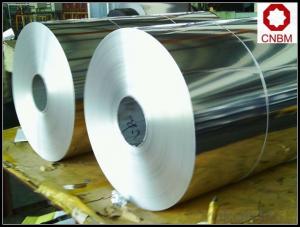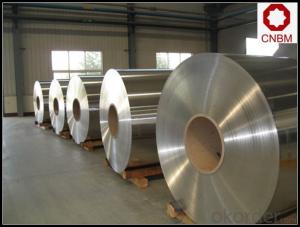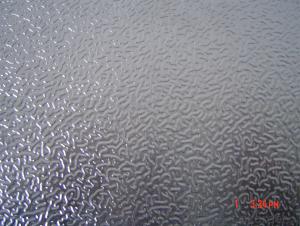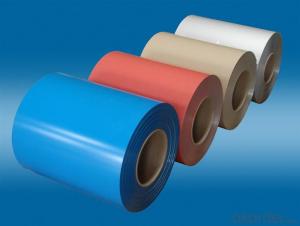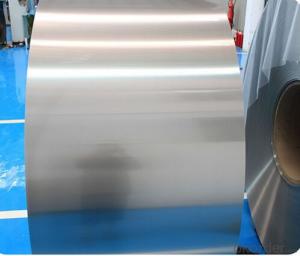Aluminum Coil Stock used for Aluminum Coil Gutter
- Loading Port:
- Shanghai
- Payment Terms:
- TT OR LC
- Min Order Qty:
- 5 m.t.
- Supply Capability:
- 10000 m.t./month
OKorder Service Pledge
OKorder Financial Service
You Might Also Like
Item specifice
1. Specification of Aluminum Coil Stock used for Aluminum Coil Gutter
1) Alloy | 1050, 1060,1100, 3003 3004 3105 3A21 5005 5052 etc |
2) Temper | O/H12/H14/H1/H18/H32/H34/H36/H38//H111/H112/H116/H321/T6/T651/T3/T351 etc |
3) Thickness | 0.1mm to 6mm |
4) Width | 20mm to 3300mm |
5) Coil weight | 100kgs to 6 tons depends on actual requirement |
6) Core material | Aluminum or paper |
7) Coil Inner diameter | 75mm, 150mm, 200mm, 300mm, 405mm, 505mm or as required |
8) Protective film can be added
2. Application of Aluminum Coil Stock used for Aluminum Coil Gutter
(1).Interior: wall cladding, ceilings, bathrooms, kitchens and balconies, shutters, doors...
(2).Exterior: wall cladding, facades, roofing, canopies, tunnels,column covers , renovations...
(3).Advertisement: display platforms, signboards, fascia, shop fronts...
3. Feature of Aluminum Coil Stock used for Aluminum Coil Gutter
*Such coil is specially designed to replace aluminum ingot, due to the high export tax of aluminum ingot, the coil has better price than ingot.
*This type of coil can fit customer's remelting furnace just like ingot, no need to make any change to the production line that was previously used for ingot. The standard coil size and weight is very suitable for the feed gate of furnace.
*This type of coil causes less material wastage than ingot when remelted.
*Our coil is made directly from ore, no need to go though the ingot making process, quality is much better than other suppliers who use ingot scrap to make coil.
Be free from Oil Stain, Dent, Inclusion, Scratches, Stain, Oxide Dicoloration, Breaks, Corrosion, Roll Marks, Dirt Streaks and other defect which will interfere with use
4. Certificate:
SGS and ROHS(if client request, paid by client), MTC(plant provided), Certificate of Origin(FORM A, FORM E, CO), Bureau Veritas and SGS (if client request, paid by client), CIQS certificate
5. Image of Aluminum Coil Stock used for Aluminum Coil Gutter
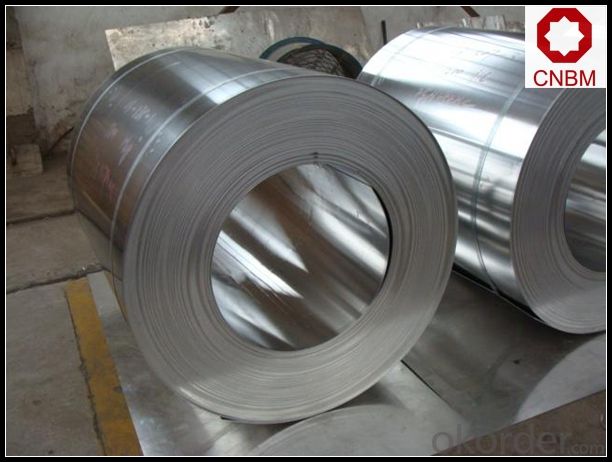
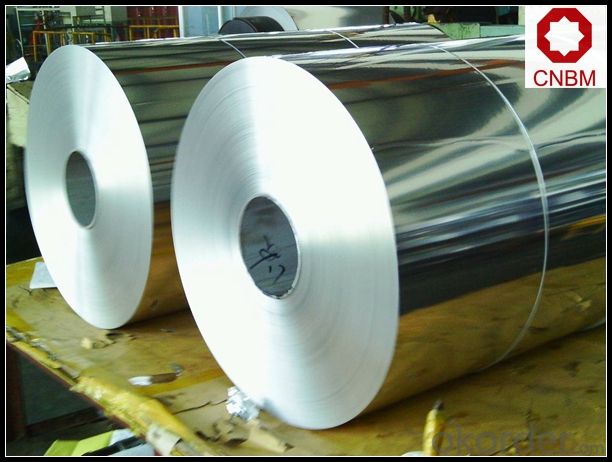
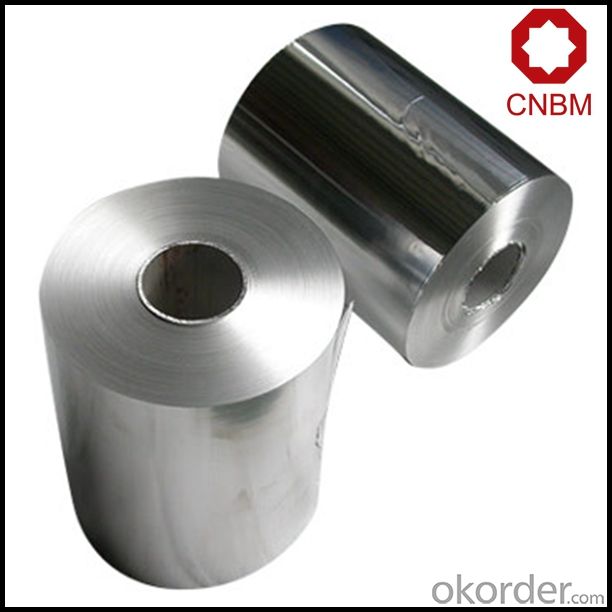
6. Package and shipping of Aluminum Coil Stock used for Aluminum Coil Gutter
eye to wall
eye to the wall
with wood pallet (wooded case also available)
7. FAQ of
1) What is the delivery time?
Dpends on actual order, around 20 to 35 days
2)What is the QC system:
We have QC staff of 20 persons and advanced equipment, each production is with MTC traced from Aluminum ingot lot.
3) What market do you mainly sell to?
Australia, America, Asia, Middle East, Western Europe, Africa etc
- Q:Are aluminum coils resistant to impact damage?
- Yes, aluminum coils are generally resistant to impact damage. Aluminum is a lightweight and durable material that can withstand minor impacts without getting damaged. However, excessive force or strong impacts may still cause damage to the coils.
- Q:Are aluminum coils suitable for interior design applications?
- Aluminum coils are indeed a fitting choice for interior design purposes. The versatility of aluminum as a material presents a multitude of advantages for interior design endeavors. To begin with, aluminum possesses a lightweight nature, ensuring ease of handling and installation. This quality proves particularly advantageous for projects necessitating extensive installations or suspended ceilings. Moreover, aluminum coils exhibit exceptional durability and corrosion resistance, guaranteeing extended lifespan and suitability for high-traffic regions. Furthermore, aluminum can be effortlessly tailored and molded to meet specific design requirements, thereby offering limitless design possibilities. Additionally, the material is available in a plethora of finishes, including brushed, polished, or anodized options, which can significantly enhance the aesthetic allure of any interior space. Furthermore, aluminum emerges as a sustainable and eco-friendly alternative, given its easy recyclability and low carbon footprint relative to other materials. All in all, aluminum coils represent a pragmatic and visually pleasing choice for interior design applications.
- Q:If this is true then how do I take my aluminums temperature without fear of breaking the themometer and get mercury all over it?
- It's easy - don't use a mercury thermometer. In fact, don't use a liquid thermometer at all. Go solid state and use a contact thermocouple thermometer - cheap as sh*t and accurate to 0.1C. Or, if the temp is high and relatively inaccessible, use an infrared or laser pyrometer.
- Q:Are aluminum coils suitable for architectural sunshades?
- Yes, aluminum coils are suitable for architectural sunshades. Aluminum is a popular material choice for sunshades due to its lightweight nature, durability, and corrosion resistance. Aluminum coils can be used to create various shapes and designs for sunshades, allowing for flexibility in architectural design. Additionally, aluminum can be easily fabricated and installed, making it a practical choice for architectural projects. Furthermore, aluminum has excellent thermal properties, allowing it to effectively reflect heat and reduce solar gain, which can help improve energy efficiency in buildings. Overall, aluminum coils are a suitable and versatile option for architectural sunshades.
- Q:For an intake manifold on a car, as far as increasing the inlet air temperature which is better steel or aluminum? Assuming the cylinder heads are aluminum, and half the thickness of steel is used versus aluminum. I know that steel has a lower heat capacity than aluminum, so does this mean even in this case the steel will heat up quicker and disperse the heat into the inlet air more than aluminum? Basically which material will keep the inlet air as low as possible. I know certain plastics are better than both, but I'm just curious about these two metals. Thank you.
- Aluminum conducts heat much better than steel. That is great for keeping valves and pistons cool but it is not great for keeping heat out of the inlet air. Aluminum is much lighter than steel so it makes lighter engines.
- Q:What are the different thickness options for aluminum coils?
- Aluminum coils are available in a wide range of thickness options to cater to various industrial and commercial applications. The thickness of aluminum coils is typically measured in gauge or millimeters (mm). Common thickness options for aluminum coils include: 1. Thin Gauge: Thin gauge aluminum coils are usually between 0.15 mm to 0.4 mm thick. These coils are commonly used for applications that require lightweight and flexible materials, such as packaging, electrical wiring, and insulation. 2. Standard Gauge: Standard gauge aluminum coils range from 0.4 mm to 2.5 mm in thickness. These coils are widely used in industries like construction, automotive, and aerospace for applications such as roofing, cladding, heat exchangers, and structural components. 3. Thick Gauge: Thick gauge aluminum coils are typically above 2.5 mm in thickness. These coils are predominantly used in heavy-duty applications that require high strength, durability, and load-bearing capacity. Examples include shipbuilding, industrial machinery, and large-scale structural frameworks. It's important to note that the availability of specific thickness options may vary depending on the manufacturer and the intended application. Custom thicknesses can also be manufactured to meet specific project requirements.
- Q:How are aluminum coils protected against chemical exposure?
- Aluminum coils are protected against chemical exposure through a variety of methods. One common method is the application of a protective coating or finish on the surface of the coils. This coating acts as a barrier between the aluminum and any potentially harmful chemicals, preventing direct contact and corrosion. Another method is the use of anodization, which involves electrolytically treating the aluminum surface to create a layer of oxide. This oxide layer provides excellent resistance against chemical exposure and enhances the overall durability of the coils. Anodized aluminum coils are widely used in industries where chemical resistance is crucial, such as in construction, automotive, and aerospace applications. Furthermore, aluminum coils can be protected by using alloys that are specifically designed to resist chemical corrosion. These alloys contain additional elements, such as copper or magnesium, which enhance the aluminum's resistance to chemical attack. By carefully selecting the appropriate alloy composition, manufacturers can ensure that the aluminum coils are better able to withstand chemical exposure. Overall, the protection of aluminum coils against chemical exposure involves a combination of protective coatings, anodization, and the use of corrosion-resistant alloys. These measures help to extend the lifespan of the coils and maintain their performance even in harsh chemical environments.
- Q:How do aluminum coils compare to other metal coils in terms of cost?
- Aluminum coils are generally more cost-effective compared to other metal coils due to the lower cost of aluminum as a raw material and its abundance in nature. Additionally, aluminum coils offer superior corrosion resistance, lightweight properties, and energy efficiency, making them a cost-efficient choice in various applications.
- Q:How are aluminum coils cut to length?
- Aluminum coils are typically cut to length using specialized machinery such as slitters or cut-to-length lines. These machines use sharp circular blades or shearing mechanisms to accurately and precisely cut the coils into desired lengths. The process involves unwinding the coil, passing it through the cutting mechanism, and then rewinding the cut pieces.
- Q:What are the different surface treatments for aluminum coils?
- Some of the different surface treatments for aluminum coils include anodizing, painting, and powder coating. Anodizing involves creating a protective oxide layer on the surface of the aluminum, providing enhanced durability and corrosion resistance. Painting involves applying a liquid paint coating to the surface, which can provide various aesthetic options and additional protection. Powder coating is a dry finishing process where a powdered coating is electrostatically applied to the aluminum surface and then cured under heat, resulting in a durable and attractive finish.
1. Manufacturer Overview |
|
|---|---|
| Location | |
| Year Established | |
| Annual Output Value | |
| Main Markets | |
| Company Certifications | |
2. Manufacturer Certificates |
|
|---|---|
| a) Certification Name | |
| Range | |
| Reference | |
| Validity Period | |
3. Manufacturer Capability |
|
|---|---|
| a)Trade Capacity | |
| Nearest Port | |
| Export Percentage | |
| No.of Employees in Trade Department | |
| Language Spoken: | |
| b)Factory Information | |
| Factory Size: | |
| No. of Production Lines | |
| Contract Manufacturing | |
| Product Price Range | |
Send your message to us
Aluminum Coil Stock used for Aluminum Coil Gutter
- Loading Port:
- Shanghai
- Payment Terms:
- TT OR LC
- Min Order Qty:
- 5 m.t.
- Supply Capability:
- 10000 m.t./month
OKorder Service Pledge
OKorder Financial Service
Similar products
New products
Hot products
Hot Searches
Related keywords
